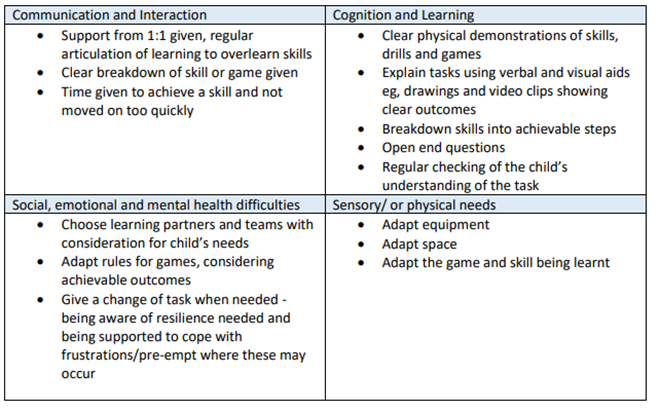Physical Education
Physical Education Curriculum and Skills Development
At Buntingford First School, our Physical Education (PE) curriculum is designed to provide students with a broad and balanced foundation in physical skills, fostering both individual and team activities. We believe in nurturing physical, mental, and emotional well-being through an engaging and dynamic PE program.
Curriculum Sequence
Our PE curriculum is carefully structured to ensure progression from foundation skills to more advanced techniques and understanding. It is designed to meet both the developmental needs and the personal growth of every student. The sequence of activities and skills taught throughout the school years is as follows:
- Early Years (Primary/Foundation Phase):
- Focus on fundamental motor skills such as running, jumping, throwing, and catching.
- Development of hand-eye coordination, balance, and agility.
- Introduction to basic games, team activities, and simple rules.
- Key Stage 1 (Primary):
- Refinement of fundamental skills with an emphasis on coordination, spatial awareness, and team cooperation.
- Introduction to simple tactics in games like tag, football, and basketball.
- Engagement in activities that promote fitness and healthy living, such as gymnastics, dance, and athletics.
- Key Stage 2 (Primary):
- In-depth skill development in a range of sports such as rugby, football, hockey, and athletics.
- More focus on strategy and tactics in games, teamwork, and leadership roles within group activities.
- Introduction to personal fitness goals and developing physical endurance, strength, and flexibility.
Skills Development
Throughout their PE journey, students develop a range of physical, personal, and social skills. These include:
- Physical Skills:
- Mastery of fundamental movement patterns.
- Improvement of strength, coordination, flexibility, and endurance.
- Performance techniques in various individual and team sports.
- Social Skills:
- Communication, collaboration, and leadership in group activities.
- Respect for others, teamwork, and fair play.
- Personal Development:
- Goal setting, perseverance, and self-confidence.
- A deeper understanding of the importance of physical activity for mental and physical health.
Progression, monitoring and Assessment
Our teachers use continuous formative assessment methods to track and support pupil progress. This includes:
- Skill-based assessments to measure proficiency in key physical activities.
- Peer and self-assessments to encourage reflection on teamwork and individual growth.
We assess our children using various methods including collecting their voice through whole class, small group and individual discussions. We encourage our children to ask questions and share their opinions and predictions. We take video footage so children can assess and comment on their own performances and that of others. We look at the learning intention and judge whether the intention has been achieved, through what we have observed as well as pupil voice.
In Early Years, we assess our children using Development Matters statements. By the time the children leave us in Reception, we assess our children against the Early Learning Goals
By following this sequence, students not only enhance their physical capabilities but also develop life skills that they can carry forward into other areas of their education and personal lives.
Why PE Matters
At Buntingford First School, we believe that Physical Education is essential in developing a child’s self-esteem, social connections, and overall well-being. Physical activity supports academic learning, enhances mental focus, and is an integral part of leading a healthy lifestyle.
We are committed to offering every student the opportunity to enjoy PE and to grow in both their physical abilities and personal confidence. We also offer a wide range of extra curricular opportunities to further enhance the provision for our children. Further details can be found on our club provision page Extra Curriculum Activites - Clubs
What does inclusion look like for children with SEND in PE?
This table includes some of the strategies which may be used as reasonable adjustments to support children with SEND in this subject area.



